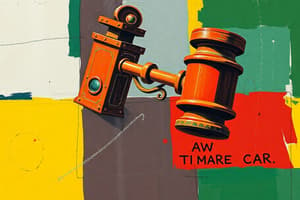Podcast
Questions and Answers
What was the primary method of proving tort through showing negligence or carelessness?
What was the primary method of proving tort through showing negligence or carelessness?
- Special case for liability
- Action on the case (correct)
- Direct interference with the claimant or property
- Intentional and indirect interference
In what century did judges begin to recognize that many people suffered loss or injury through careless acts?
In what century did judges begin to recognize that many people suffered loss or injury through careless acts?
- Nineteenth century
- Seventeenth century
- Eighteenth century (correct)
- Twentieth century
What was the primary reason for the development of the principle of negligence?
What was the primary reason for the development of the principle of negligence?
- To recognize that many people suffered loss or injury through careless acts (correct)
- To abolish the principle of foreseeability
- To provide a means of establishing liability for intentional acts
- To establish a general duty of care
What was the result of the establishment of the principle of negligence?
What was the result of the establishment of the principle of negligence?
What was the primary limitation of the tort system before the development of the principle of negligence?
What was the primary limitation of the tort system before the development of the principle of negligence?
What was the main characteristic of the principle of negligence before the twentieth century?
What was the main characteristic of the principle of negligence before the twentieth century?
What is the term for the defendant's failure to act when they have a duty to do so?
What is the term for the defendant's failure to act when they have a duty to do so?
In the case of Murphy v Brentwood District Council, what was the outcome of the claimant's lawsuit against the council?
In the case of Murphy v Brentwood District Council, what was the outcome of the claimant's lawsuit against the council?
What is the name of the test that was overruled by the House of Lords in the Murphy v Brentwood District Council case?
What is the name of the test that was overruled by the House of Lords in the Murphy v Brentwood District Council case?
What was the reason for the council's lack of liability in the Murphy v Brentwood District Council case?
What was the reason for the council's lack of liability in the Murphy v Brentwood District Council case?
What is the term for the defendant's wrongful act?
What is the term for the defendant's wrongful act?
What was the result of the criticism by senior judges of the two-part test in the 1980s?
What was the result of the criticism by senior judges of the two-part test in the 1980s?
What type of proximity is established when physical damage is caused by the defendant's negligence?
What type of proximity is established when physical damage is caused by the defendant's negligence?
What is required to establish liability in cases of nervous shock?
What is required to establish liability in cases of nervous shock?
What is the purpose of the requirement that it is just and reasonable to impose a duty?
What is the purpose of the requirement that it is just and reasonable to impose a duty?
In the case of Hemmens v Wilson Browne, why was there no duty owed by the solicitors to the third party?
In the case of Hemmens v Wilson Browne, why was there no duty owed by the solicitors to the third party?
What is the significance of policy considerations in determining duties owed by public bodies?
What is the significance of policy considerations in determining duties owed by public bodies?
What is a key distinction between physical damage and nervous shock cases?
What is a key distinction between physical damage and nervous shock cases?
What is the ruling in Sirros v Moore QB 118 regarding judges' liability?
What is the ruling in Sirros v Moore QB 118 regarding judges' liability?
What is the alternative means of compensating victims mentioned in Hill v Chief Constable of West Yorkshire?
What is the alternative means of compensating victims mentioned in Hill v Chief Constable of West Yorkshire?
What was the outcome of the Reeves v Commissioner of the Metropolitan Police case?
What was the outcome of the Reeves v Commissioner of the Metropolitan Police case?
What is the issue that has been challenged in a human rights context regarding police immunity?
What is the issue that has been challenged in a human rights context regarding police immunity?
What was the outcome of the Osman v United Kingdom ECtHR case?
What was the outcome of the Osman v United Kingdom ECtHR case?
What was the circumstance of the Osman v United Kingdom ECtHR case?
What was the circumstance of the Osman v United Kingdom ECtHR case?
What is the default position regarding compensation for loss?
What is the default position regarding compensation for loss?
What was the reasoning behind the Court of Appeal's decision in Harris v Perry?
What was the reasoning behind the Court of Appeal's decision in Harris v Perry?
What is required for a duty of care to be imposed on the defendant?
What is required for a duty of care to be imposed on the defendant?
What is the primary concern of judges when determining liability?
What is the primary concern of judges when determining liability?
What must the defendant do to be considered to have breached their duty of care?
What must the defendant do to be considered to have breached their duty of care?
What is the significance of the principle in past cases?
What is the significance of the principle in past cases?
Flashcards are hidden until you start studying




